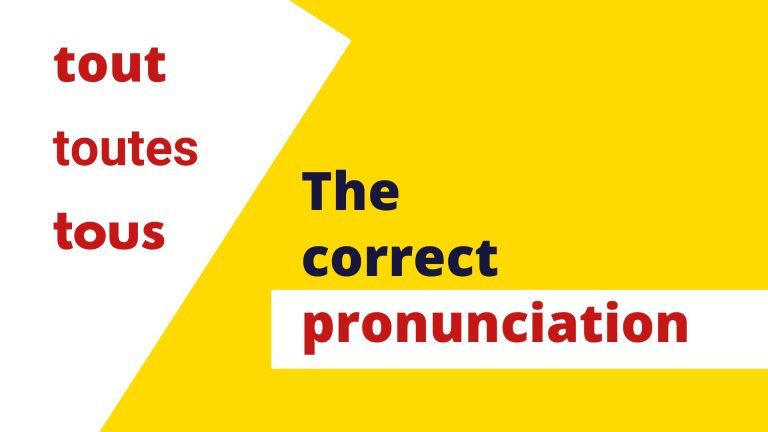Pronunciation of the words: tout, toutes, and tous
Updated: 8 December, 2023 by Mylene in Pronunciation Lessons ▪

The pronunciation of the words “tous”, “tout” and “toutes” is not obvious. Everything depends on two choices: the function of this word in the sentence and the first letter of the word that follows. Sometimes you have to link or chain, or linking is simply not allowed. In the following we will study in the order of the pronunciation of tout, tous and tous:
- Adjective: tout, toutes, tous
- Adverb: tout, toutes, tous
- Pronoun: tout, toutes, tous
- Noun: le tout
- A video to practice
1. Adjective: tout, toutes, tous
Tout
The liaison is required. The letter t is pronounced [t].
- tout‿un plat [tu tɛ̃ pla] a whole dish
- tout‿être [tu tɛtʁ] all being
toutes
The letters”tes” are pronounced [t].
- toutes les femmes [tut le fam] all the women
tous
“Tous” is pronounced [tu].
- je travaille tous les jours [tu le ʒuʁ] I work everyday
2. Adverb: tout, tous, toutes
We generally make the connection, it is very frequent, but it is not obligatory.
- tout aimable is pronounced: [tu te mabl] with a liaison or [tu e mabl] without liaison. all kind
- tout entendu is pronounced: [tu tɑ̃ tɑ̃ dy] with a liaison or [tu ɑ̃ tɑ̃ dy] without liaison. heard it all
An adverb is usually invariable.
But “tout” is an exception when modifying a feminine adjective beginning with an aspirated h or a consonant.
The letter e can be added at the end of the word. For example:
- (1) Elle est tout émue. The feminine adjective “émue” starts with the vowel “é” and “tout” ends with the consonant “t”. We make the liaison: [tu te my]. she is all moved
- (2) Elle est tout heureuse. The feminine adjective “heureuse” begins with a mute h and “tout” ends with the consonant “t”. We make the liaison: [tu tø ʁøz]. she is very happy
- (3) Elle est toute contente. The feminine adjective “contente” begins with a consonant (different from h) so we add a mute “e” to the word “tout”. All happy is pronounced: [tut kɔ̃ tɑ̃t]. she is very happy
- (4) Elle est toute honteuse. The feminine adjective “honteuse” begins with an aspirated “h” so we add a silent “e” to the word “tout”. All ashamed is pronounced: [tut ɔ̃ tøz]. she is so ashamed
The same rule applies to the feminine plural. The pronunciation does not change.
- (5) Ce sont des femmes tout émues. (invariable, before a vowel) : [tu te my]. they are women all moved
- (6) Ce sont des femmes tout heureuses. (invariable, before a mute h) : [tu tø ʁøz]. they are women all happy
- (7) Ce sont des femmes toutes contentes. (accord, before a consonant) : [tut kɔ̃ tɑ̃t]. they are women all happy
- (8) Ce sont des femmes toutes honteuses. (accord, before an aspirated h) : [tut ɔ̃ tøz]. they are women all ashamed
3. Pronoun: tout, tous, toutes
Tout
The liaison is optional.
- tout a fonctionné or tout // a fonctionné everything worked
- tout‿est fini or tout // est fini. all is finished
Toutes
The liaison is rare when toutes is the subject.
- toutes ont dit la même chose : [tuṱ zɔ̃ di], the s is pronounced z. they all said the same thing
We more often say [tu tɔ̃ di], with a small break between “toutes” and “ont”.
The liaison is forbidden when “toutes” is after the verb.
- elles ont toutes // accepté. [tut ak sɛp te], they all agreed
Tous
“Tous” is pronounced [tus]. There is no liaison because the lettre S is pronounced, but there is an enchainement.
- tous ont dit [tu sɔ̃ di] all said
- tous étaient d’accord [tu se tɛ da kɔʁ] all agreed
- ils ont tous accepté [il zɔ̃ tu sak sɛp te] all accepted
4. Noun
Tout
Concretely, there are many silent consonants in French. These consonants are not pronounced in specific contexts. These silent consonants appear in the writing of certain French words. However, they do not speak orally in situations well determined by the rules of the language. So, in the word tout, the t is always silent.
- le tout // est de venir [lə tu ɛ də və niʁ]. it’s all about coming
5. A video to practice
Watch this video to hear the correct pronunciation of the words tous, tout, and toutes. Subscribe to the channel to be informed of new video lessons.
Another difficult word to master
The French word “plus” is one of the words we use every day, but the word also has three different pronunciations. This word can be an adverb or a noun. When the word plus is a noun, you will always pronounce the [s] sound at the end. However, when the word plus is an adverb, the pronunciation becomes complicated. The word “more” is certainly difficult to master, but the word also includes three different pronunciations. You can learn more by consulting this article, which details the rules for pronouncing the word plus when used as an adverb.


